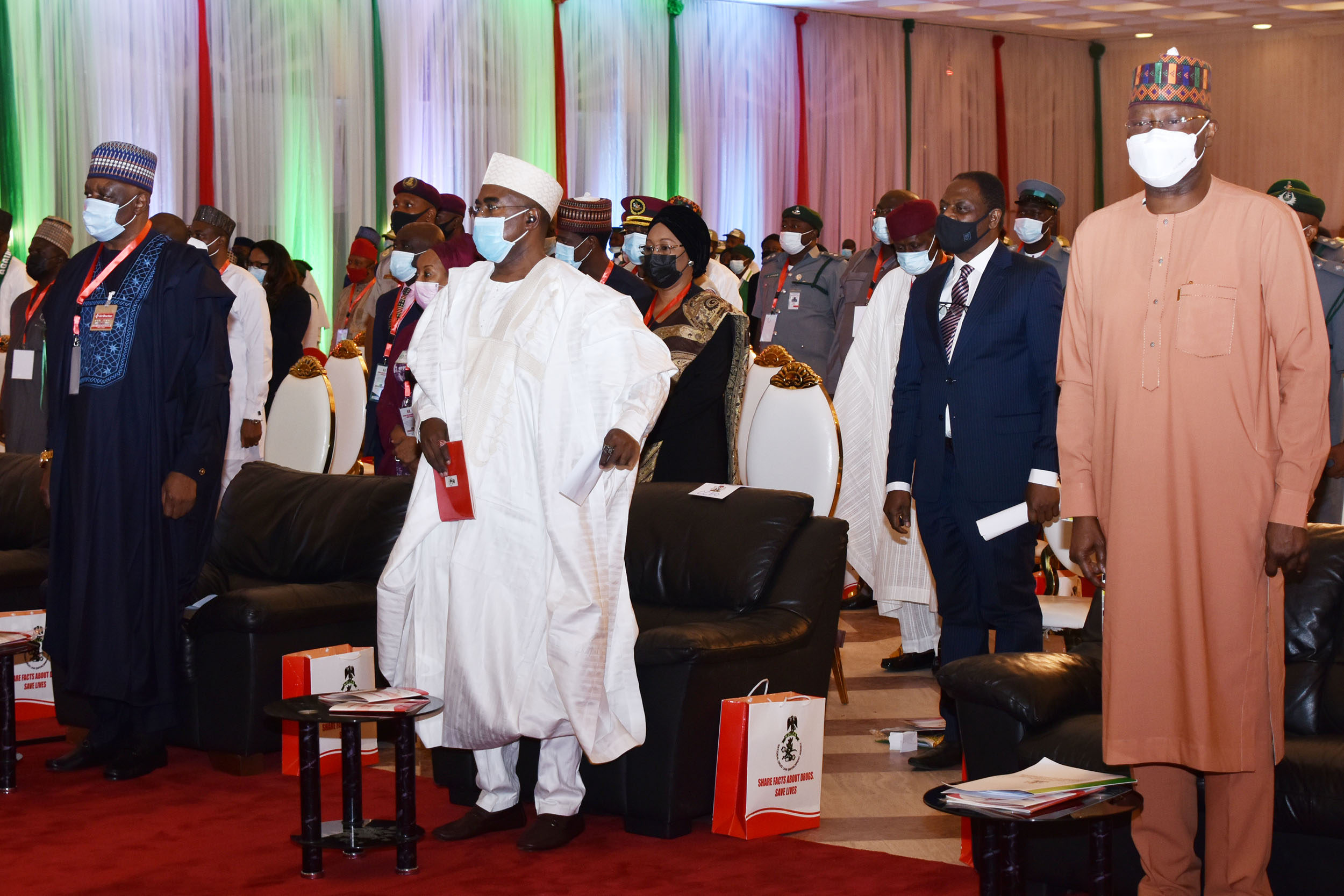Featured
NDLEA Intercepts N1.04bn Worth Tramadol

The National Drug Law Enforcement Agency (NDLEA) has intercepted 2,465,000 tablets of tramadol 225mg and 250mg, weighing 2,356kg, smuggled through the Murtala Muhammed International Airport, Ikeja, Lagos State.
The NDLEA spokesperson, Femi Babafemi, in a statement, said the seizure, which took place at the weekend, was worth N1,040,000,000 in street value.
This is coming barely a week after about 13.5 million pills of the same opioid worth over N8.8bn were recovered by operatives of the NDLEA from one of the mansions of a billionaire drug baron in the Victoria Garden City, Lagos.
The statement partly reads, “following credible intelligence, the agency had shown interest in the consignment of 52 cartons that came into Nigeria from Karachi, Pakistan, with six different airway bills via an Ethiopian Airline flight, comprising seven cartons of 250mg of a brand called tamral and 45 cartons of 225mg, branded as tramaking.
“Soon after its arrival at the Lagos airport, the NDLEA called for a joint examination of the consignment with other stakeholders and after its information was confirmed by all, the 52 cartons of the seized substance, which are above the recommended threshold for medical use and banned in the country, were moved to the agency’s facility.
“In the same vein, another bid to export through the airport 15 parcels of cannabis and 600grams of tramadol 225mg concealed in a sack of crayfish to Dubai, UAE, was equally thwarted by operatives who seized the consignment and subsequently arrested a freight agent, Osahor Alex Ekwueme, who presented it for export.
“Weeks after NDLEA operatives intercepted 5.20kgs of cannabis concealed in kegs of palm oil going to Dubai at the NAHCO export shed of the airport, the brains behind the consignment, Ifeanyi Egbuwaohia, has been arrested in the Igando area of Lagos.
“Though Ifeanyi works as a technician at Computer Village, Ikeja, beneath his known business, he also works with a drug network in Dubai, where he sends illicit drugs for distribution. “A few hours after his arrest, another consignment of 2.60kgs of the same substance sent by him for export to Dubai was also intercepted by operatives at the airport.
“Another consignment of 1.30kgs of cannabis concealed in reconstructed engine blocks going to Dubai has also been seized at the SAHCO export shed while two persons: Olatunji Kehinde Temiola and Osemojoye Femi Sunday, have been arrested in connection to the bid”, the statement revealed.
Featured
PANDEF Hails Tinubu For Lifting Emergency Rule In Rivers

The Pan Niger Delta Forum (PANDEF) has hailed the lifting of the State of Emergency in Rivers State, effective midnight, Wednesday, September 17, 2025.
In a statement signed by Board members and National Executive Committee members, yesterday, PANDEF commended President Bola Tinubu for rectifying what they described as an anomaly.
The statement was co-signed by Co-Chairmen, PANDEF Board of Trustees, Alfred Diette-Spiff and Obong Victor Attah, National Chairman Ambassador Godknows Boladei Igali, and National Secretary, Beks Dagogo-Jack.
Tinubu declared a State of Emergency in Rivers State on the 18th of March, 2025, suspending Governor Siminalayi Fubara, the Deputy Governor, and members of the state House of Assembly for six months in the first instance.
In place of the governor, the President appointed Vice Admiral Ibok-Ete Ibas (retd) as Sole Administrator.
However, Tinubu announced the suspension of the Emergency Rule on Wednesday, stating, “It therefore gives me great pleasure to declare that the emergency in Rivers State shall end with effect from midnight today (Wednesday).”
The Forum commended Fubara’s unwavering perseverance and “faith in the divine will of Almighty God,” while also commending the Deputy Governor, Professor Ngozi Odu, the Speaker, and members of the House of Assembly, who were equally affected by the suspension.
“The Board and National Executive Committee of the Pan Niger Delta Forum, the apex socio-political organisation representing the South-South geopolitical zone, joins millions of Nigerians in welcoming the lifting of the state of emergency in Rivers State, effective midnight, Wednesday, September 17, 2025.
“While PANDEF had expressed strong reservations regarding the erstwhile emergency rule, we commend His Excellency, President Bola Ahmed Tinubu, GCFR, for taking this bold step to rectify the anomaly.
“We welcome Governor Siminalayi Fubara back to his elected office and salute his unwavering perseverance and faith in the divine will of Almighty God. We extend similar commendations to the Deputy Governor, Professor Ngozi Oduah, the Speaker, and members of the House of Assembly, who were equally affected by the suspension,” the statement read.
Addressing Rivers people, the forum declared, “Light has returned to the state and a new glorious dawn has come. A moment in which the bitter pains of the past months will inspire all to rededicate themselves to true mutual forbearance, new alignments and forward movement.”
They urged political leaders and citizens to put the past behind them and work towards the collective good of the State, while pledging to support Rivers’ developmental trajectory under Fubara.
“All hearts and hands must therefore be joined together to put the past behind us and work towards the collective good of the state.
“We look forward to the State’s return to normalcy and the resumption of its developmental trajectory under the leadership of Governor Fubara and his team. PANDEF reiterates its commitment to supporting the government and people of Rivers State in their pursuit of progress and development,” the statement added.
Featured
RSG Approves Full Rehabilitation of State Secretariat …Unveils Housing Scheme for Civil Servants, Honours Veterans

Rivers State Administrator, Vice Admiral Ibok-Eteh Ibas (Rtd), has approved the complete rehabilitation and modernization of the Rivers State Secretariat Complex to enhance efficiency and productivity in the civil service.
Ibas made the announcement at the 2025 Civil Service Week Gala and Awards Ceremony held at Banquet Hall, Government House, Port Harcourt, on Wednesday,.
He disclosed that “initiative is designed to transform the secretariat into a modern, efficient and conducive work environment, directly supporting the civil servants who form the backbone of the state’s governance.”
The Administrator also approved the provision of 106 housing units for civil servants in the State.
Ibas paid glowing tribute to retired Heads of Service and Permanent Secretaries, describing them as the bedrock of the state’s administration.
He stated that the awards ceremony was a symbol of deep appreciation for decades of sacrifice, resilience, and commitment.
“These interventions are designed to not only recognize your service, but also to improve your welfare in tangible and lasting ways,” the Administrator stated.
“We must build an administration that is efficient, effective, and truly citizen-centric,” he added.
The Administrator urged serving officers to draw inspiration from their predecessors and strive to make a meaningful impact in the lives of citizens.
He emphasized the importance of embracing innovation, technology, and continuous training to build a civil service equipped for the future.
The Acting Head of Rivers State Civil Service, Dr. (Mrs.) Inyingi Brown, in her welcome address, described the civil service as the “engine room of government” and expressed profound gratitude to the Administrator for his unwavering support and commitment to its modernization.“
“A society that does not honour its heroes is not worthy of emulation,” Dr. Brown remarked, lauding the retirees as torchbearers of discipline and loyalty.
She pledged to build on their legacy through reforms and innovation, projecting that the Rivers State Civil Service would become a model of efficiency and transparency by 2030.
Speaking on behalf of the retirees, President of the Association of Retired Permanent Secretaries, Sir Promise Njowhor,
expressed heartfelt appreciation for the historic recognition.
“For once, since the creation of the State, we are being honoured,” Njowhor said, adding, “Our morale has been lifted.”
He pledged the association’s continuous support for government programmes, describing the body of experienced retirees as a resource available to contribute to state development.
The rehabilitation of the State Secretariat and the new housing scheme represent a major investment in the infrastructure and dignity of public service in Rivers State, signaling a new era of support for the civil servants who drive the government’s policies and programmes.
The Tide reports that the Administrator also conferred awards of meritorious service on retired Heads of Service and Permanent Secretaries in the State
Featured
Rivers LG Poll: APC Wins 20 chairmanship seats, PDP Clears Three
The All Progressives Congress (APC) has won 20 out of the 23 local government areas in the just concluded local government election in the State, while the Peoples Democratic Party (PDP) clinched three local governments.
According to the results released by the Rivers State independent Electoral Commission (RSIEC), yesterday, the APC won the chairmanship seats in Abua/Odual, Andoni, Opobo Nkoro, Ahoada East, Ahoada West, Okrika, Ogu/Bolo and Khana local government areas.
APC also won in Gokana, Tai, Oyigbo, Bonny, Eleme, Etche, Omuna, Akuku Toru, Asari Toru, Degema, Ikwerre and Emohua local government areas.
The Commission, however, said the PDP won in Port Harcourt City, Obio/Akpor, and Ogba Egbema Ndoni local government areas.
Chairman of the Commission, Dr Michael Odey, who announced the results at the Commission headquarters in Port Harcourt, said Ofori Owolabi of the APC scored 28,755 votes to emerge winner of the election for Abua Odual while Solomon Ochomma, also of the APC, emerged chairman elect for Ahoada East after scoring 54,509 votes.
Odey said Eugene Epelle also of the APC scored 84,125 votes to emerge winner in Ahoada West, while Bob Fubara was elected the chairman-elect for Akuku Toru after scoring 63,593 votes.
Similarly APC chairmanship candidate Lucky Otuo Promise emerged chairman-elect for Andoni after scoring a total of 126,181 votes, APC’s George Onengiyeofori emerged winner in Asari Toru after scoring 56,383 votes, while Pepple Blessing Abinye garnered 13,543 votes to emerge winner in Bonny Local Government Area.
Other APC candidates elected include Michael John Williams who scored 16,536 votes to emerge chairman-elect for Degema Local Government; Obarlllormate Ollor (77,452) for Eleme; Dr Chidi Julius Lloyd (114,380) for Emohua; Njoku Boniface (100,649) for Etche; Confidence Deekor (96,478) for Gokana, while Wobodo Charles got 62,746 votes to emerge winner in Ikwerre Local Government Area.
Other APC winners from the APC include Akuro Tobins (32,285 votes) for Okrika; Hon Obasi Uchechukwu (38,530) for Omuma; James A James (38,822) for Opobo Nkoro; Vincent Nemieboka (36,374) for Ogu/Bolo; Hon Mbakpone Okpe (70,080) for Tai LGA, while in Oyigbo, Okechukwu Akara scored 101,495 votes to emerge winner.
Meanwhile, the RSIEC chairman announced Dr Gift Worlu of the PDP with 328,823 votes to emerge winner in Obio Akpor; Shedrack Ogbogu, also of the PDP, scored 51,051 votes for Ogba Egbema Ndoni Local Government Area, while in Port Harcourt City, Sir Alwell Ihunda garnered 235,054 votes for PDP to emerge winner.
The APC also cleared the councillorship seats in Abua/Odual, Andoni, Ahoada East, Ahoada West, Okrika, Ogu/Bolo and Khana, Oyigbo, Bonny, Eleme, Etche,Tai, Khana Opobo/Nkoro and Degema local government areas.
Similarly APC councillorship candidates also emerged winners in Asari Toru, Degema, Akuku Toru, Gokana and Khana while PDP cleared the councillorship seats in Obio/Akpor, Port Harcourt city, and Ogba Egbema/ Ndoni Local Government Areas
Meanwhile, the Forum of State Independent Electoral Commissions has passed a vote of confidence on the just concluded local government election in the State.
National Chairman of the forum, Hon. Mamman Nda Eri, said this in an interview with newsmen in Port Harcourt.
Eri said all the chairmen across the country were in Port Harcourt to monitor the election as well as gain experience in an election under emergency rule.
John Bibor & King Onunwor

